人教新目标(Go for it)版英语七年级下册 Review of Unit 11课件(42张)
文档属性
| 名称 | 人教新目标(Go for it)版英语七年级下册 Review of Unit 11课件(42张) | 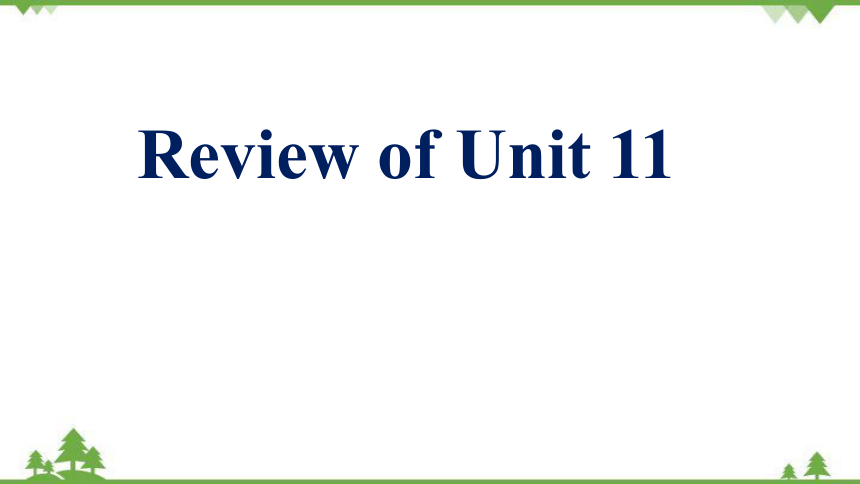 | |
| 格式 | ppt | ||
| 文件大小 | 2.0MB | ||
| 资源类型 | 教案 | ||
| 版本资源 | 人教新目标(Go for it)版 | ||
| 科目 | 英语 | ||
| 更新时间 | 2022-06-09 21:28:36 | ||
图片预览

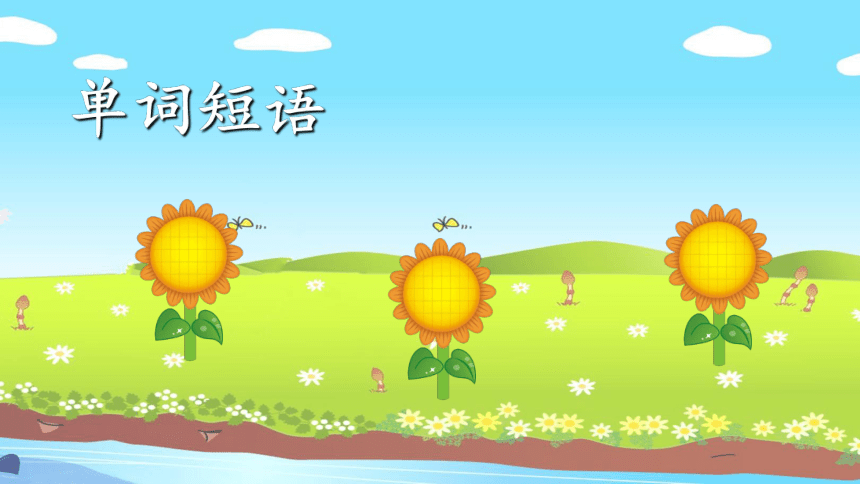
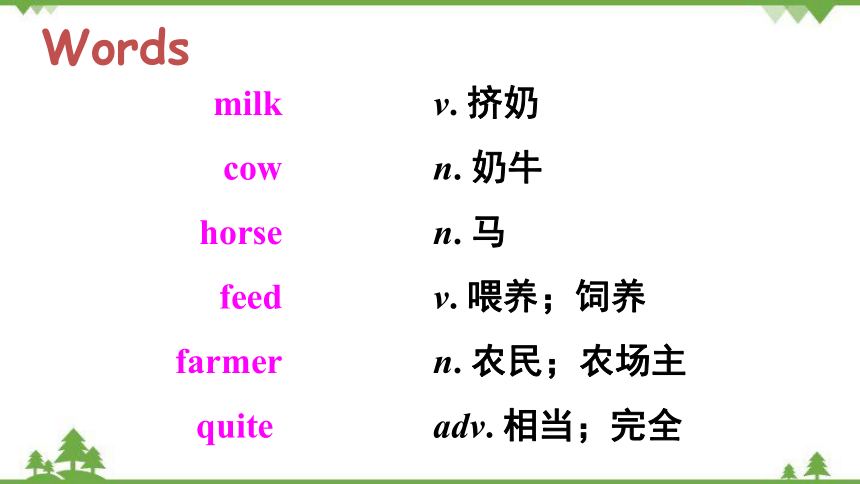
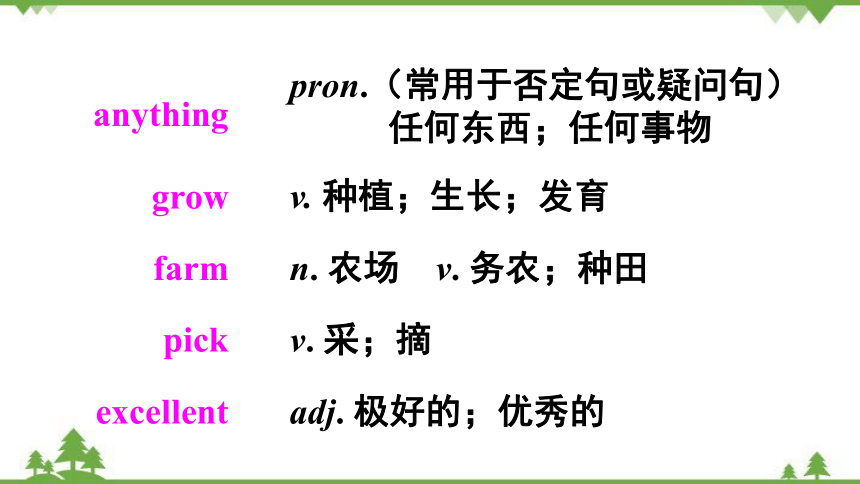
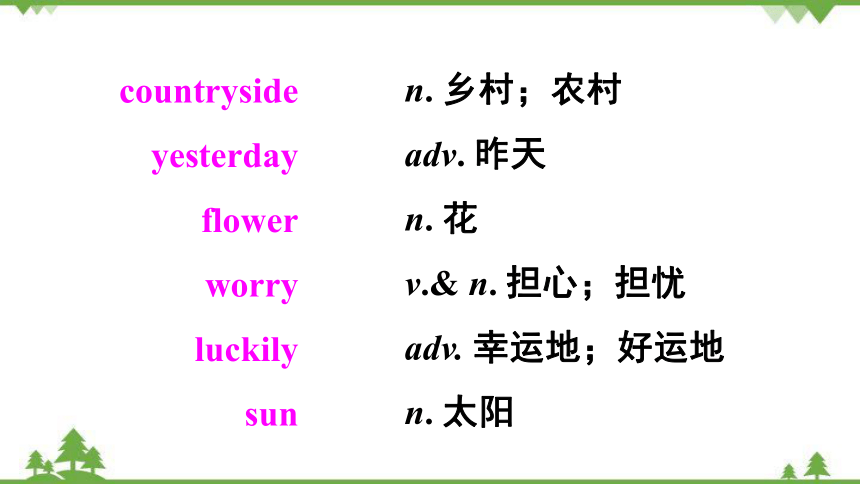
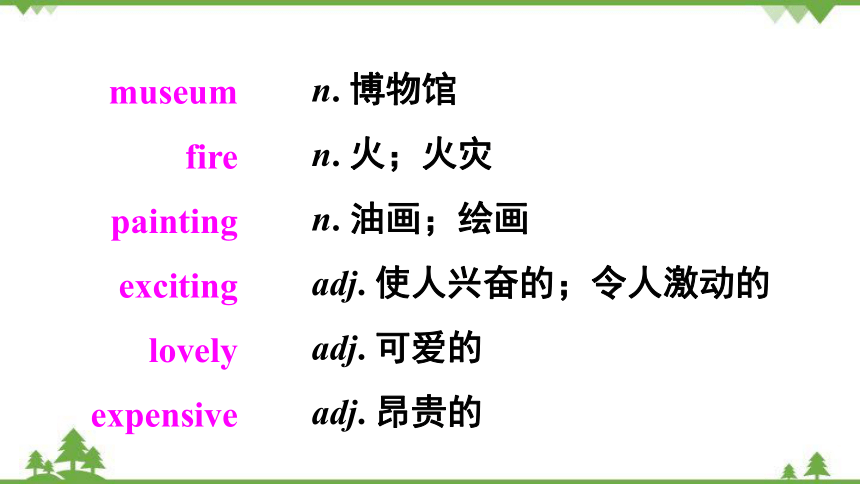
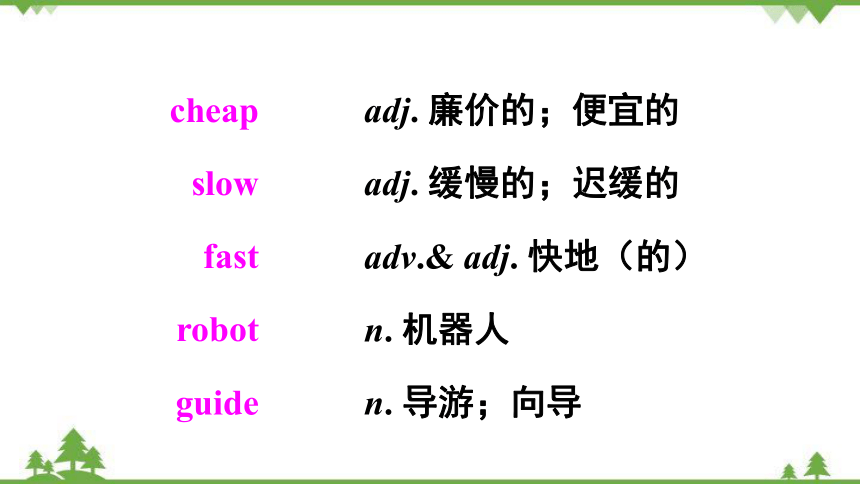
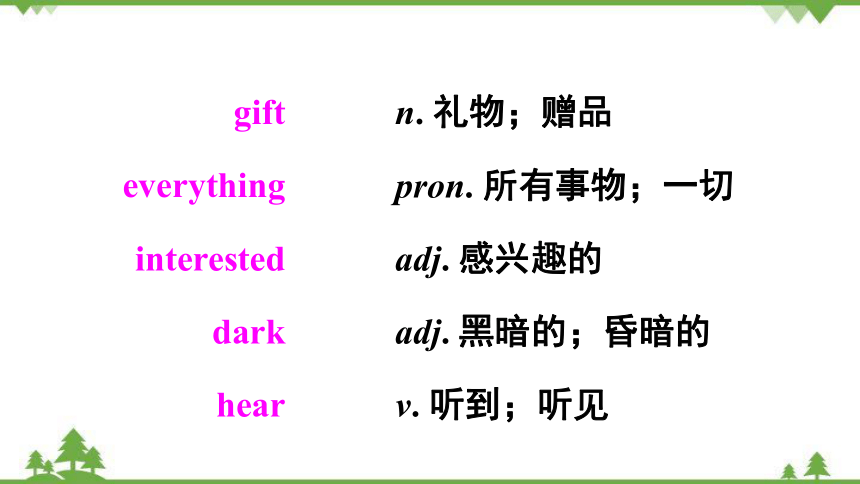
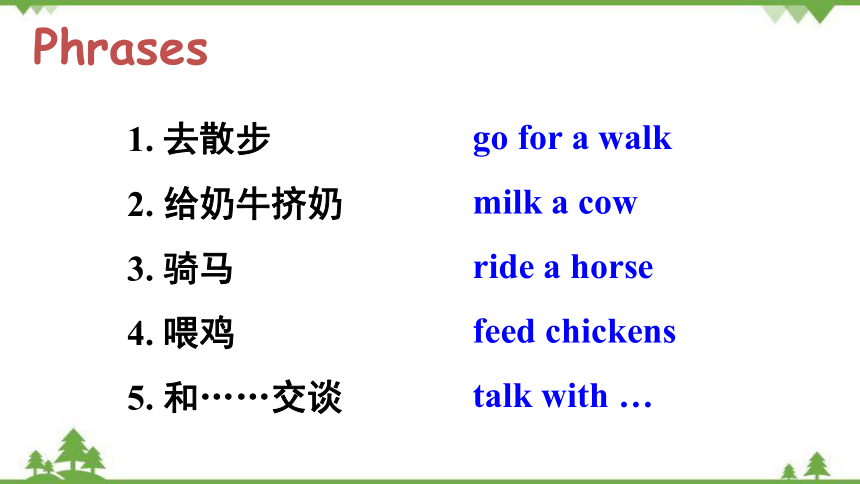
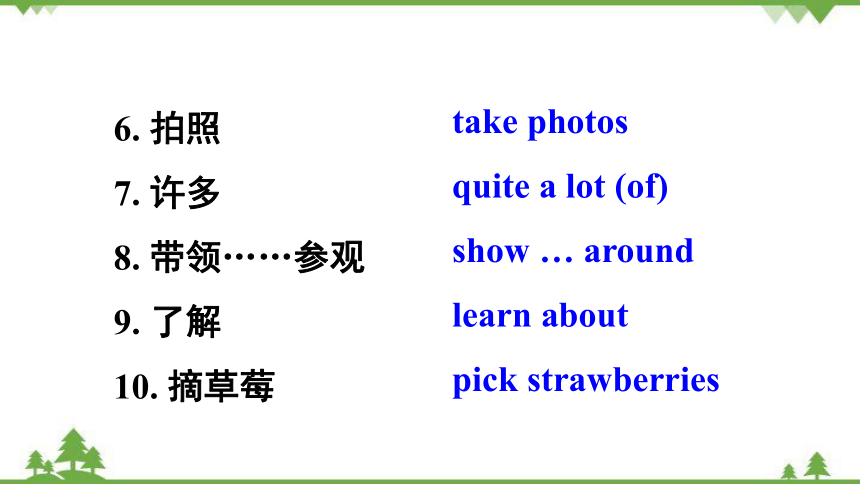
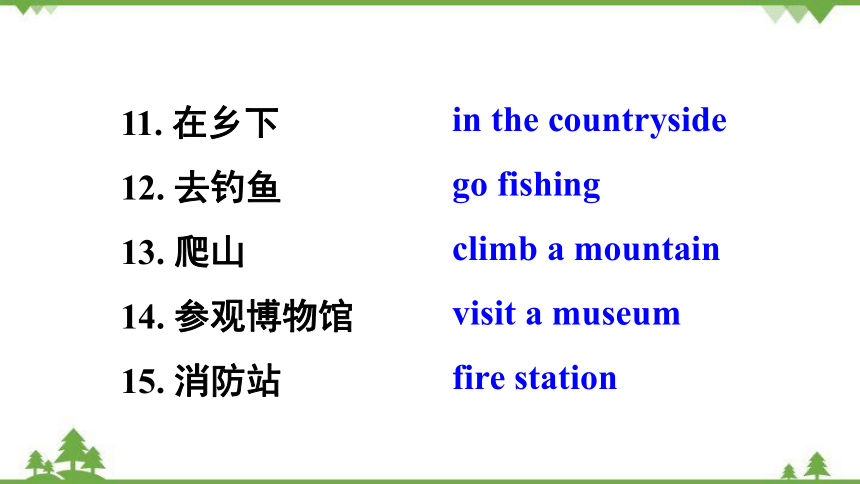
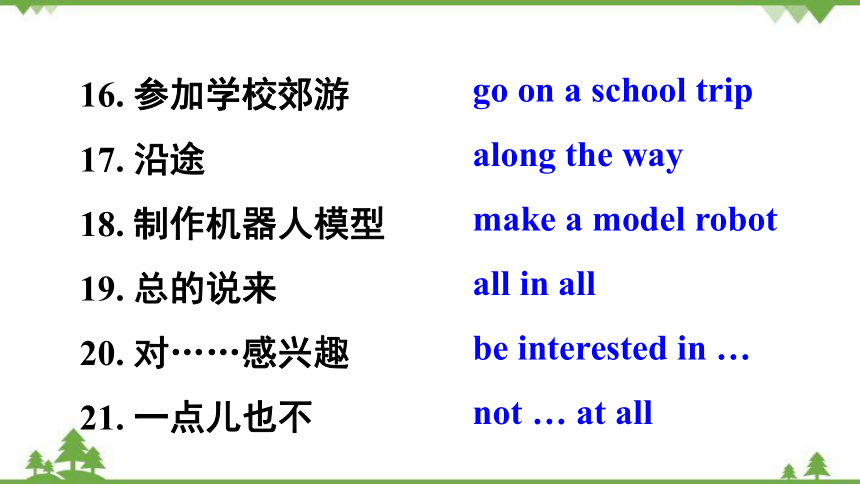
文档简介
(共42张PPT)
Review of Unit 11
单词短语
v. 挤奶
n. 奶牛
n. 马
v. 喂养;饲养
n. 农民;农场主
adv. 相当;完全
Words
milk
cow
horse
feed
farmer
quite
pron.(常用于否定句或疑问句)
任何东西;任何事物
v. 种植;生长;发育
n. 农场 v. 务农;种田
v. 采;摘
adj. 极好的;优秀的
anything
grow
farm
pick
excellent
n. 乡村;农村
adv. 昨天
n. 花
v.& n. 担心;担忧
adv. 幸运地;好运地
n. 太阳
countryside
yesterday
flower
worry
luckily
sun
n. 博物馆
n. 火;火灾
n. 油画;绘画
adj. 使人兴奋的;令人激动的
adj. 可爱的
adj. 昂贵的
museum
fire
painting
exciting
lovely
expensive
adj. 廉价的;便宜的
adj. 缓慢的;迟缓的
adv.& adj. 快地(的)
n. 机器人
n. 导游;向导
cheap
slow
fast
robot
guide
n. 礼物;赠品
pron. 所有事物;一切
adj. 感兴趣的
adj. 黑暗的;昏暗的
v. 听到;听见
gift
everything
interested
dark
hear
Phrases
go for a walk
milk a cow
ride a horse
feed chickens
talk with …
1. 去散步
2. 给奶牛挤奶
3. 骑马
4. 喂鸡
5. 和……交谈
take photos
quite a lot (of)
show … around
learn about
pick strawberries
6. 拍照
7. 许多
8. 带领……参观
9. 了解
10. 摘草莓
in the countryside
go fishing
climb a mountain
visit a museum
fire station
11. 在乡下
12. 去钓鱼
13. 爬山
14. 参观博物馆
15. 消防站
go on a school trip
along the way
make a model robot
all in all
be interested in …
not … at all
16. 参加学校郊游
17. 沿途
18. 制作机器人模型
19. 总的说来
20. 对……感兴趣
21. 一点儿也不
即时演练
一、根据句意及汉语提示填写单词。
1. I saw some interesting animals _________ (昨天).
2. Don’t _______ (担心) about me. I am old enough
(足够).
3. _________ (幸运地), we got to the bus station in
time.
yesterday
worry
Luckily
4. We must get to the top of the mountain before
the ______ (太阳) rises (升起).
5. Are there any _______ (奶牛) on the farm
6. Mike rode a _______ (马) last weekend.
sun
cows
horse
7. —Did you see any chickens
—Yes, I saw _______ (相当) a lot.
8. Mr. Zhang is an __________ (优秀的) teacher in
our school.
9. We _______ (摘) some apples and took them
home yesterday.
quite
excellent
picked
二、根据句意及图片提示填写单词。
1. I visited a __________ last month.
2. Jack’s father works in a ______ station.
3. They visited the art museum and saw many
__________ yesterday.
museum
fire
paintings
4. There are many beautiful trees and ________
around the houses.
5. I went _______ with my grandfather yesterday.
flowers
fishing
三、根据汉语意思完成句子,每空一词。
1. 我们昨天在乡下钓鱼了。
We went fishing ___ ____ __________ yesterday.
2. 周末去骑马是件很有趣的事情。
It’s interesting to ____ __ _____ on the weekend.
3. 李叔叔上周末给一头奶牛挤了奶。
Uncle Li _______ ____ ______ last weekend.
in the countryside
ride a horse
milked a cow
4. 我今天早上在公园拍了一些照片。
I _____ _____ _______ in the park this morning.
5. 农场主带领蒂娜参观了农场。
The farmer _______ Tina ________ the farm.
6. 总的来说,那电影令人兴奋。
____ ____ ____, the film is very _________.
took some photos
showed
around
All in all
exciting
7. 制作机器人模型很难。
It’s difficult ____ ______ a model _______.
8. 我一点都不喜欢这部电影。
I don’t like the film ____ ______.
9. 这个女孩对舞蹈很感兴趣。
The girl ____ _________ ____ dancing.
to make
robot
at all
is interested in
重点语法
一般过去时
一般过去时表示过去某个时间发生的_____
或___________,常和表示过去的时间状语连用。
定义
动作
存在的状态
与一般过去时连用的时间状语:
just now, … ago, in 1980, last night/ week/ month/ year/ this morning, yesterday 等常与一般过去时连用。
句型结构
(1)含be动词的一般过去时的句型结构:
否定句:在was/were后面加not,即 was
not (wasn’t)/were not (weren’t)
一般疑问句:把was/were提前放到句首,且
首字母要大写。
(2)含实义动词的一般过去时的句型结构:
肯定句:主语 + 动词过去式 + 其他.
例:他上星期天玩得很开心。
He had a good time last Sunday.
否定句:主语 + did not (didn’t) + 动词原形 + 其他.
例:他们昨天没有去购物。
They didn’t go shopping yesterday.
一般疑问句:Did + 主语 + 动词原形 + 其他?
肯定回答:Yes, 主语 + did.
否定回答:No, 主语 + didn’t.
翻译:昨天你去动物园了吗?
是的,我去了。/ 不,我没去。
— Did you go to the zoo yesterday
— Yes, I did. /No, I didn’t.
特殊疑问句:疑问词+did+主语+动词原形+其他?
翻译:你是什么时候洗衣服的?
What time did you wash the clothes
动词过去式的构成
be动词的过去式
am / is→was; are→were
主语是第一人称和第三人称单数形式用was,其他人称用were。
动词的
规则变化
① 一般直接在词尾加-ed clean→cleaned
② 词尾是不发音的字母e的,只加-d
like→liked
③ 词尾为重读闭音节,结尾只有一个辅音
字母的,应双写该辅音字母,再加-ed
stop→stopped
④ 词尾为辅音字母加y的,应将y改为i,
再加-ed study→studied
即时演练
1. use _______ 2. is / am _______
3. are _______ 4. have _______
5. do _______ 6. go _______
7. teach _______ 8. stop _______
9. play _______ 10. forget _______
一、写出下列动词的过去式。
used
were
did
taught
played
was
had
went
stopped
forgot
二、用括号内所给动词的适当形式填空。
1. I _______ (brush) my teeth three times yesterday.
2. Linda _______ (do) some housework yesterday
morning.
3. We _______ (go) to school on foot last year.
brushed
did
went
4. We _______ (have) so much fun in the Green
Park last weekend.
5. We _______ (visit) Mr. Liu last Sunday.
6. Jack _______ (get) up late this morning.
had
visited
got
7. The child ______ (see) his old friend on the way
home yesterday.
8. They ______ (be) always late for class last year.
9. What day ______ (be) it yesterday
10. She went to the farm and _______ (milk) the
cow yesterday.
saw
were
was
milked
三、按要求完成句子,每空一词。
1. Tom’s parents were at home last night. (改为一般
疑问句并作否定回答)
— _____ Tom’s parents at home _____ _______
— No, _____ ________.
2. The boys ate much bread for lunch. (对画线部分
提问)
______ ______ the boys _____ for lunch
Were
last night
they weren’t
What did
eat
3. He did morning exercises in the morning. (改为否
定句)
He ______ ____ morning exercises in the morning.
4. They had a big dinner yesterday. (对画线部分提问)
______ _____ they _____ yesterday
didn’t do
What did
do
5. Mr. Wang went to America by plane. (对画线部
分提问)
_____ _____ Mr. Wang ____ to America
How did
go
当堂训练
一、单项选择。
1. I went ______ a school trip yesterday. Let’s go
out ______ a walk.
A. for; on B. on; to C. on; for D. to; on
2. —How ______ your last trip
—It was not bad.
A. was B. were C. is D. am
3. — Did you find ______ funny in the book
— Yes. It talks about how to be a good kid.
A. nothing B. something
C. anything D. everything
4. The gift from my friend is getting old ______, but
I still like it very much.
A. usually B. differently C. slowly D. early
5. — Can I have a talk with you now
— Sorry, I’m ______ busy.
A. quite B. also C. just D. only
6. — Do you like this new kind of mobile phone,
madam
— Yes. But it’s too ______, and I can’t afford(买
得起) it.
A. popular B. lovely C. cheap D. expensive
二、从方框内选择合适的句子补全对话。
(有两项多余)
A. What about you
B. Then I studied for the test.
C. Because I went to the school trip.
D. No, I stayed at home.
E. Well, it wasn’t bad.
F. Because I had lots of things to do.
G. Where did you have lunch
Jim: Hi, Sally. Did you go on the school trip I
didn’t see you on Sunday.
Sally: 1. _____
Jim: Why
Sally: 2. _____
Jim: What did you do
Sally: I cleaned my room and did my homework.
3. _____
D
F
B
Review of Unit 11
单词短语
v. 挤奶
n. 奶牛
n. 马
v. 喂养;饲养
n. 农民;农场主
adv. 相当;完全
Words
milk
cow
horse
feed
farmer
quite
pron.(常用于否定句或疑问句)
任何东西;任何事物
v. 种植;生长;发育
n. 农场 v. 务农;种田
v. 采;摘
adj. 极好的;优秀的
anything
grow
farm
pick
excellent
n. 乡村;农村
adv. 昨天
n. 花
v.& n. 担心;担忧
adv. 幸运地;好运地
n. 太阳
countryside
yesterday
flower
worry
luckily
sun
n. 博物馆
n. 火;火灾
n. 油画;绘画
adj. 使人兴奋的;令人激动的
adj. 可爱的
adj. 昂贵的
museum
fire
painting
exciting
lovely
expensive
adj. 廉价的;便宜的
adj. 缓慢的;迟缓的
adv.& adj. 快地(的)
n. 机器人
n. 导游;向导
cheap
slow
fast
robot
guide
n. 礼物;赠品
pron. 所有事物;一切
adj. 感兴趣的
adj. 黑暗的;昏暗的
v. 听到;听见
gift
everything
interested
dark
hear
Phrases
go for a walk
milk a cow
ride a horse
feed chickens
talk with …
1. 去散步
2. 给奶牛挤奶
3. 骑马
4. 喂鸡
5. 和……交谈
take photos
quite a lot (of)
show … around
learn about
pick strawberries
6. 拍照
7. 许多
8. 带领……参观
9. 了解
10. 摘草莓
in the countryside
go fishing
climb a mountain
visit a museum
fire station
11. 在乡下
12. 去钓鱼
13. 爬山
14. 参观博物馆
15. 消防站
go on a school trip
along the way
make a model robot
all in all
be interested in …
not … at all
16. 参加学校郊游
17. 沿途
18. 制作机器人模型
19. 总的说来
20. 对……感兴趣
21. 一点儿也不
即时演练
一、根据句意及汉语提示填写单词。
1. I saw some interesting animals _________ (昨天).
2. Don’t _______ (担心) about me. I am old enough
(足够).
3. _________ (幸运地), we got to the bus station in
time.
yesterday
worry
Luckily
4. We must get to the top of the mountain before
the ______ (太阳) rises (升起).
5. Are there any _______ (奶牛) on the farm
6. Mike rode a _______ (马) last weekend.
sun
cows
horse
7. —Did you see any chickens
—Yes, I saw _______ (相当) a lot.
8. Mr. Zhang is an __________ (优秀的) teacher in
our school.
9. We _______ (摘) some apples and took them
home yesterday.
quite
excellent
picked
二、根据句意及图片提示填写单词。
1. I visited a __________ last month.
2. Jack’s father works in a ______ station.
3. They visited the art museum and saw many
__________ yesterday.
museum
fire
paintings
4. There are many beautiful trees and ________
around the houses.
5. I went _______ with my grandfather yesterday.
flowers
fishing
三、根据汉语意思完成句子,每空一词。
1. 我们昨天在乡下钓鱼了。
We went fishing ___ ____ __________ yesterday.
2. 周末去骑马是件很有趣的事情。
It’s interesting to ____ __ _____ on the weekend.
3. 李叔叔上周末给一头奶牛挤了奶。
Uncle Li _______ ____ ______ last weekend.
in the countryside
ride a horse
milked a cow
4. 我今天早上在公园拍了一些照片。
I _____ _____ _______ in the park this morning.
5. 农场主带领蒂娜参观了农场。
The farmer _______ Tina ________ the farm.
6. 总的来说,那电影令人兴奋。
____ ____ ____, the film is very _________.
took some photos
showed
around
All in all
exciting
7. 制作机器人模型很难。
It’s difficult ____ ______ a model _______.
8. 我一点都不喜欢这部电影。
I don’t like the film ____ ______.
9. 这个女孩对舞蹈很感兴趣。
The girl ____ _________ ____ dancing.
to make
robot
at all
is interested in
重点语法
一般过去时
一般过去时表示过去某个时间发生的_____
或___________,常和表示过去的时间状语连用。
定义
动作
存在的状态
与一般过去时连用的时间状语:
just now, … ago, in 1980, last night/ week/ month/ year/ this morning, yesterday 等常与一般过去时连用。
句型结构
(1)含be动词的一般过去时的句型结构:
否定句:在was/were后面加not,即 was
not (wasn’t)/were not (weren’t)
一般疑问句:把was/were提前放到句首,且
首字母要大写。
(2)含实义动词的一般过去时的句型结构:
肯定句:主语 + 动词过去式 + 其他.
例:他上星期天玩得很开心。
He had a good time last Sunday.
否定句:主语 + did not (didn’t) + 动词原形 + 其他.
例:他们昨天没有去购物。
They didn’t go shopping yesterday.
一般疑问句:Did + 主语 + 动词原形 + 其他?
肯定回答:Yes, 主语 + did.
否定回答:No, 主语 + didn’t.
翻译:昨天你去动物园了吗?
是的,我去了。/ 不,我没去。
— Did you go to the zoo yesterday
— Yes, I did. /No, I didn’t.
特殊疑问句:疑问词+did+主语+动词原形+其他?
翻译:你是什么时候洗衣服的?
What time did you wash the clothes
动词过去式的构成
be动词的过去式
am / is→was; are→were
主语是第一人称和第三人称单数形式用was,其他人称用were。
动词的
规则变化
① 一般直接在词尾加-ed clean→cleaned
② 词尾是不发音的字母e的,只加-d
like→liked
③ 词尾为重读闭音节,结尾只有一个辅音
字母的,应双写该辅音字母,再加-ed
stop→stopped
④ 词尾为辅音字母加y的,应将y改为i,
再加-ed study→studied
即时演练
1. use _______ 2. is / am _______
3. are _______ 4. have _______
5. do _______ 6. go _______
7. teach _______ 8. stop _______
9. play _______ 10. forget _______
一、写出下列动词的过去式。
used
were
did
taught
played
was
had
went
stopped
forgot
二、用括号内所给动词的适当形式填空。
1. I _______ (brush) my teeth three times yesterday.
2. Linda _______ (do) some housework yesterday
morning.
3. We _______ (go) to school on foot last year.
brushed
did
went
4. We _______ (have) so much fun in the Green
Park last weekend.
5. We _______ (visit) Mr. Liu last Sunday.
6. Jack _______ (get) up late this morning.
had
visited
got
7. The child ______ (see) his old friend on the way
home yesterday.
8. They ______ (be) always late for class last year.
9. What day ______ (be) it yesterday
10. She went to the farm and _______ (milk) the
cow yesterday.
saw
were
was
milked
三、按要求完成句子,每空一词。
1. Tom’s parents were at home last night. (改为一般
疑问句并作否定回答)
— _____ Tom’s parents at home _____ _______
— No, _____ ________.
2. The boys ate much bread for lunch. (对画线部分
提问)
______ ______ the boys _____ for lunch
Were
last night
they weren’t
What did
eat
3. He did morning exercises in the morning. (改为否
定句)
He ______ ____ morning exercises in the morning.
4. They had a big dinner yesterday. (对画线部分提问)
______ _____ they _____ yesterday
didn’t do
What did
do
5. Mr. Wang went to America by plane. (对画线部
分提问)
_____ _____ Mr. Wang ____ to America
How did
go
当堂训练
一、单项选择。
1. I went ______ a school trip yesterday. Let’s go
out ______ a walk.
A. for; on B. on; to C. on; for D. to; on
2. —How ______ your last trip
—It was not bad.
A. was B. were C. is D. am
3. — Did you find ______ funny in the book
— Yes. It talks about how to be a good kid.
A. nothing B. something
C. anything D. everything
4. The gift from my friend is getting old ______, but
I still like it very much.
A. usually B. differently C. slowly D. early
5. — Can I have a talk with you now
— Sorry, I’m ______ busy.
A. quite B. also C. just D. only
6. — Do you like this new kind of mobile phone,
madam
— Yes. But it’s too ______, and I can’t afford(买
得起) it.
A. popular B. lovely C. cheap D. expensive
二、从方框内选择合适的句子补全对话。
(有两项多余)
A. What about you
B. Then I studied for the test.
C. Because I went to the school trip.
D. No, I stayed at home.
E. Well, it wasn’t bad.
F. Because I had lots of things to do.
G. Where did you have lunch
Jim: Hi, Sally. Did you go on the school trip I
didn’t see you on Sunday.
Sally: 1. _____
Jim: Why
Sally: 2. _____
Jim: What did you do
Sally: I cleaned my room and did my homework.
3. _____
D
F
B
同课章节目录
- Unit 1 Can you play the guitar?
- Section A
- Section B
- Unit 2 What time do you go to school?
- Section A
- Section B
- Unit 3 How do you get to school?
- Section A
- Section B
- Unit 4 Don't eat in class.
- Section A
- Section B
- Unit 5 Why do you like pandas?
- Section A
- Section B
- Unit 6 I'm watching TV.
- Section A
- Section B
- Review of Units 1-6
- Unit 7 It's raining!
- Section A
- Section B
- Unit 8 Is there a post office near here?
- Section A
- Section B
- Unit 9 What does he look like?
- Section A
- Section B
- Unit 10 I'd like some noodles.
- Section A
- Section B
- Unit 11 How was your school trip?
- Section A
- Section B
- Unit 12 What did you do last weekend?
- Section A
- Section B
